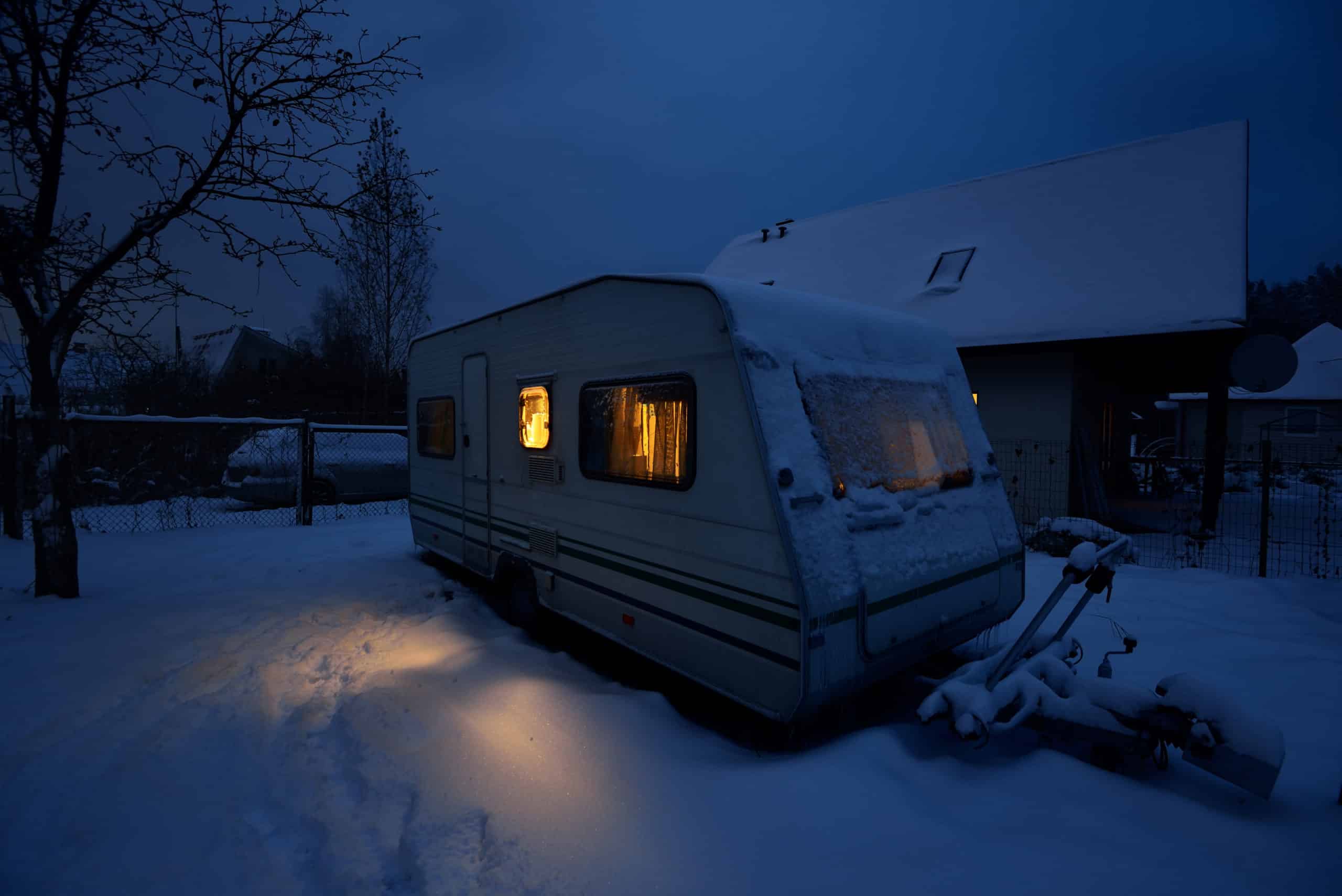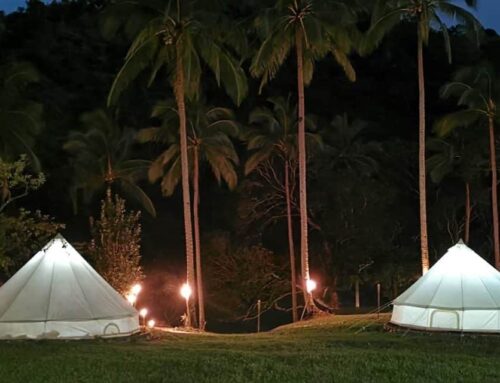When it comes to camping during the winter months in Connecticut it is quite common for snow to appear quickly and quite substantially. Though your day might have started with clear skies you could find yourself in the middle of a brutal snowstorm in a hurry.
This randomness is obviously a part of the appeal of taking a trip in a travel trailer, but it can also be devastating and difficult to navigate when you are not prepared for it. Most individuals who experience severe problems during voyages on snowy and icy roads are ultimately not prepared for these conditions.
Furthermore, the lack of preparation for these individuals has also led to these same individuals being unable to determine what they should do next. Sometimes driving in the snow requires quick decision making and sometimes it requires a calm head and a set of chains. The key is knowing how and when to use all of the tools and tricks in your wheelhouse.
The following list of tips included below will take a look at some of the basic strategies and tools that can allow you to better navigate less than ideal road conditions. Several of the strategies listed below should be used in tandem with each other to ensure the safety of yourself and everyone else driving on the road. If you are planning to take a long voyage in your travel trailer or simply looking to prepare yourself for when you do, you should continue to read below.
Go Slow
The best piece of advice one can receive for driving in the snow is “keep it slow.” It doesn’t matter if you are driving in winter weather conditions in a small two-door sedan or a mack truck, your speed is going to be the number one factor that determines how dangerous the situation is for you. When you drive in snowy conditions at a higher speed you are more and more likely to slide, slip, and spin out of control.
It is likely that if you are driving a travel trailer lowering your speed is something you are already conscious of when driving in any conditions. However, once snow starts to fall you should continue to decrease the speeds at which you are towing. A travel trailer’s weight can cause more severe problems when out of control. Therefore, what would have been a simple slip in a two-door sedan might become a tumble out of control in a travel trailer.
Keeping your speeds lower will also likely prevent you from having to use any evasive maneuvers to prevent your travel trailer from sliding out of control. Just like that old children’s story, when it comes to towing a travel trailer in the snow, slow and steady does really win the race.
Check the Weather
Another critical tip for towing a travel trailer in the snow is to make a complete plan for your trip. How long will you be driving during this stint? Where is your end destination, and how long are you likely to have to drive in the snow? Figuring out a complete plan for your trip is a good way to keep yourself safe and focused while driving through icy conditions.
If you are on a snowy road and approaching the end destination you set for previously laid out for yourself then you will have less guilt about pulling over and pausing your journey for the night. Many individuals who embark on long journeys towing their travel trailers get into trouble when they push themselves into conditions they didn’t prepare for. Therefore, that is why it is a good idea to make a plan for your trip from the beginning, but also to revise this plan as conditions become clearer or worsen.
If you are traveling with a companion or your family, involving them in the planning of the trip is a great way to keep everyone honest and on the same page. This way if you face severe snowy conditions you will all be on the same page about how you are going to handle the situation.
Keep a Safe Distance
Most automobile accidents in the United States are a result of motorists driving at an unsafe distance from another vehicle. When young students are enrolled in driving school, states around the country recommend that motorists keep their vehicles a safe three seconds away from any other vehicle they are following. While this following distance is a good rule of thumb to remember when driving a small car in perfect conditions, when towing a travel trailer in the snow this distance needs to be increased dramatically.
Already, in perfect conditions, you should maintain a distance longer than three seconds away from any car you are following if you are towing something heavy like a travel trailer. It only makes sense that a heavier vehicle would take more time to stop than a lighter and more maneuverable vehicle.
In the snow, the average stopping distance of a vehicle increases dramatically. For a small car, the likely stopping distance goes from between 60 and 100 feet to 600 feet or more. With a large vehicle that is towing a travel trailer this distance will only increase more dramatically. The maneuverability of your larger vehicle and the travel trailer it is towing will also decrease further in the snow. The chart below looks at the average stopping distance of a standard sedan in different conditions. Obviously, when towing a travel trailer your stopping distance will be far greater in every type of condition.
| ROAD AND WEATHER CONDITION | STOPPING DISTANCE FOR STANDARD SEDAN |
| Dry Road | 60 to 100 feet |
| Wet Road | 120 feet or more |
| Packed Snow Road | 180 feet or more |
| Icy Road | 600 feet or more |
Dial Back Your Trailer’s Brake Controller
The job of your trailer’s brake controller is to tell the brakes exactly when and how hard to press against the trailer’s tires to stop the trailer. Under normal conditions your brake controller will tell your trailer’s brakes to apply significant pressure to the trailer’s tires. However, in snowy or icy conditions it is likely that you will want your trailer’s brakes to push against the wheels lightly to prevent them from locking up if you begin to slide on various patches of ice.
Towing experts recommend that you adjust your trailer’s brake controller to the minimum setting when you first start driving in snowy conditions. After you have adjusted the brake controller, you should begin to test out the brakes and see if you would like to have more pressure applied to the trailer’s tires. If you do feel you need more pressure when braking, you can adjust the brake controller once again, this time a bit higher than before.
Dialing back your trailer’s brake controller is a good strategy to improve your towing conditions when in winter weather, but you should also still maintain a good distance from other vehicles and drive at significantly slower speeds than you normally would on a dry road. Remember, the best strategy for towing a travel trailer in the snow is to use all of these various tips in tandem with each other.
Winter Tires
Another good tip for towing a travel trailer in the snow is to make sure your vehicle and travel trailer are equipped with tires designed to perform in snowy conditions. Not all tires are created equally and some in fact perform very poorly in any condition other than a dry road.
The last thing you want to do is try to navigate your travel trailer across a snowy highway with less than optimal tires. Unlike traditional tires, snow tires or winter weather tires are designed with large gaps between the tread and are sometimes equipped with metal studs. The larger gaps and studs in the tread of snow tires are designed to provide more bite and traction in severe driving conditions. The best performing snow tires have been put through rigorous testing and should display a three-peak mountain snowflake symbol on their sidewall. This snowflake symbol is used in the tire industry to indicate that certain tires have passed specific traction tests. The table listed below compares the differences between regular tires and snow tires in closer detail.
| TYPE OF TIRE | CHARACTERISTICS |
| Standard Tires | Smaller tread gaps, no metal or ceramic studs present, less capable in snow or ice, quieter than snow tires |
| Snow Tires | Larger tread gaps, metal or ceramic studs may be present, more capable in snow or ice, louder than standard tires |
Have an Emergency Bag Ready
While you should be able to navigate most snowy conditions safely if you follow the various tips listed above, there is always a chance that you may get stuck and stranded for the night or until conditions improve. Putting together an emergency bag that includes safety items like flashlights, batteries, blankets, flares, extra food, and water is always a good idea when you expect you may have to travel through snowy conditions.
It is highly unlikely that you will have to utilize the items in your snow emergency bag. However, you would be better off putting the emergency bag together and not needing it than laughing it off and then being stranded without it. At the very least, you should have extra blankets and some type of battery-operated heater in your travel trailer in case of an emergency. After all, you never can be certain what you will experience on the road. Your emergency bag may just save another motorist who is not prepared and find themselves in trouble.
Be Aware of Other Drivers
It is likely that you will not be the only driver on the road when you are towing your travel trailer through snowy conditions. While other drivers could be helpful if you had a problem and were in need of assistance, they can also become a liability if they are inexperienced at driving in snowy conditions.
Not every travel trailer operator is going to read this winter weather towing guide and not every motorist is properly prepared to drive in the snow. These inexperienced drivers may not maintain a proper distance or drive at speeds that are acceptable for the conditions. When you are towing your travel trailer in snowy conditions you should do your best to avoid other drivers and high traffic areas. Avoiding these areas will improve the safety of the drivers around you and yourself. You never can be sure how experienced another driver on the road is, and in snowy conditions, it is best if you can avoid all other vehicles as much as possible.
When in Doubt, Stop for the Night
Finally, the last tip for towing your travel trailer in the snow is when in doubt, stop for the night.
It just isn’t worth it. Sometimes conditions are just too severe and it is not safe to tow your travel trailer. Knowing when it is safe to tow and when the conditions are just too severe can be the difference between your life and death or the life and death of another motorist on the road.
If you are on a long journey with your travel trailer, you will have time later in the trip to make up time if you stop when conditions are rough. If you are equipped with snow chains, snow tries, have dialed back your brake controller, and you feel in control of your trailer then by all means proceed on your path. However, if you are nervous or experiencing problems while navigating the snowy or icy roads, you should just pull over.
Once again, it just is not worth it!





